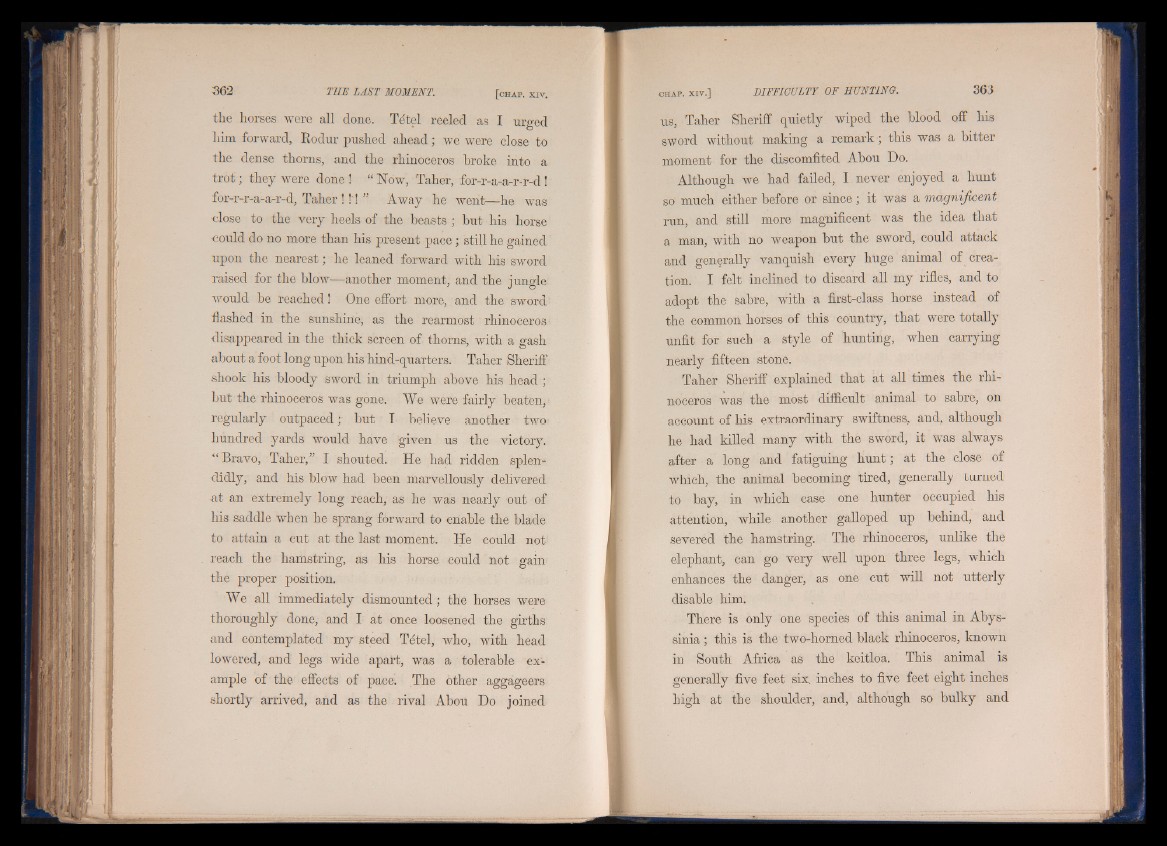
the horses were all done. Tetel reeled as I urged
him forward, Rodur pushed ahead; we were close to
the dense thorns, and the rhinoceros broke into a
trot; they were done! “ Now, Taher, for-r-a-a-r-r-d!
for-r-r-a-a-r-d, Taher !!'! ” Away he went—he was
■close to the very heels of the beasts ; but his horse
■could do no more than his present pace; still he gained
upon the nearest; he leaned forward with his sword
raised for the blow—another moment, and the jungle
would be reached! One effort more, and the sword
flashed in the sunshine; as the rearmost rhinoceros:
disappeared in the thick screen of thorns, with a gash
about a foot long upon his hind-quarters. Taher Sheriff
shook his bloody sword in triumph above his head ;
but the rhinoceros was gone. We were fairly beaten,;
regularly outpaced; but I believe another two
hundred yards would have given us the victory.
“ Bravo, Taher,” I shouted. He had ridden splendidly,
and his blow had been marvellously delivered
at an extremely long reach, as he was nearly out of
his saddle when he sprang forward to enable the blade
to attain a cut at the last moment. He could not’
reach the hamstring, aLs his horse could not gain
the proper position.
We all immediately dismounted; the horses were
thoroughly done, and I at once loosened the girths
and contemplated my steed T^tel, who, with head
lowered, and legs wide apart, was a tolerable example
of the effects of pace. The other aggageers
shortly arrived, and as the rival Abou Do joined
us, Taher Sheriff quietly wiped the blood off his
sword without making a remark ; this was a bitter
moment for the discomfited Abou Do.
Although we had failed, I never enjoyed a hunt
so much either before or since; it was a magnificent
run, and still more magnificent was the idea that
a man, with no weapon but the sword, could attack
and generally vanquish every huge animal of creation.
I felt inclined to discard all my rifles, and to
adopt the sabre, with a first-class horse instead of
the common horses of this country, that were totally
unfit for such a style of hunting, when carrying
nearly fifteen stone.
Taher Sheriff explained that at all times the rhinoceros
was the most difficult animal to sabre, on
account of his extraordinary swiftness, and, although
he had killed many with the sword, it was always
after a long and fatiguing hunt; at the close of
which, the animal becoming tired, generally turned
to bay, in which case one hunter occupied his
attention, while another galloped up behind, and
severed the hamstring. The rhinoceros, unlike the
elephant, can go very well upon three legs, which
enhances the danger, as one cut will not utterly
disable him.
There is only one species of this animal in Abyssinia
; this is the two-horned black rhinoceros, known
in South Africa as the keitloa. This animal is
generally five feet six. inches to five feet eight inches
high at the shoulder, and, although so bulky and